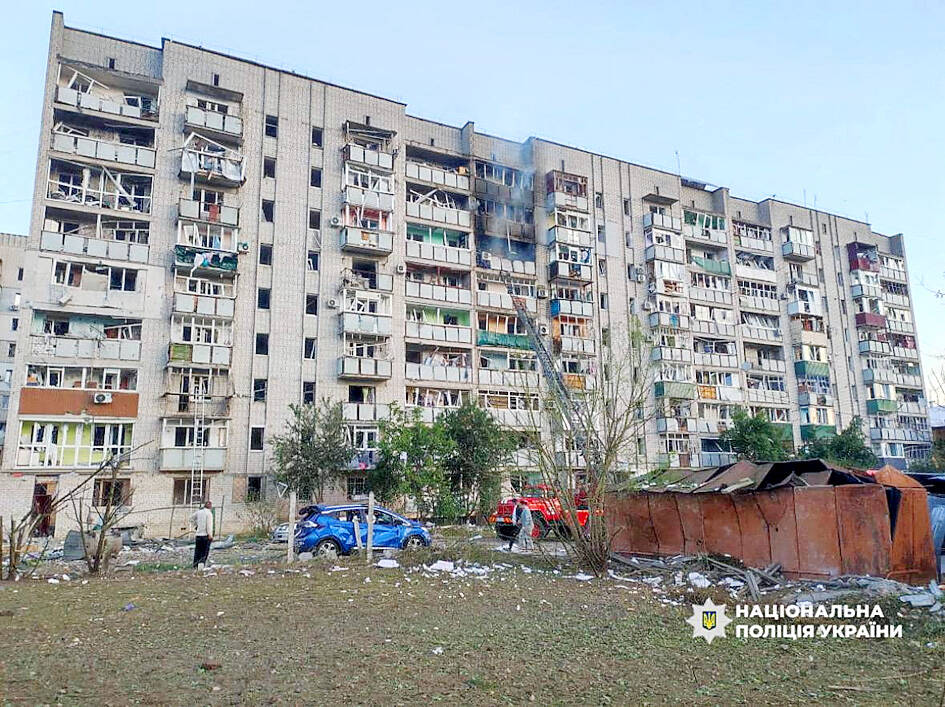Russia used hundreds of drones, cruise and ballistic missiles to attack western, southern and central Ukraine overnight, damaging homes and infrastructure and injuring at least six people, local authorities said yesterday.
Ukraine lost its third F-16 fighter jet since the start of the war while repelling the attack, the Ukrainian military said.
The sounds of explosions were heard in Lviv, Poltava, Mykolaiv, Dnipropetrovsk and Cherkasy regions, regional governors said.

Photo: The National Police of Ukraine via Reuters
The Ukrainian military said about 500 different types of aerial weapons were used during the attack, including drones, and ballistic and cruise missiles.
“To repel the massive attack, all available means of the defense forces that can operate on enemy air assets were deployed,” the military said.
The pilot of the Ukrainian F-16 jet did everything he could and flew the jet away from a settlement but did not have time to eject, the Ukrainian Air Force said.
“The pilot used all of his onboard weapons and shot down seven air targets. While shooting down the last one, his aircraft was damaged and began to lose altitude,” it said on Telegram.
The Ukrainian military said Russia had launched 477 drones and 60 missiles of various types to Ukraine overnight while Ukrainian forces destroyed 211 drones and 38 missiles.
It said 225 drones were lost — in reference to the Ukrainian military using electronic warfare to redirect them — or they were drone simulators that did not carry warheads.
It said air strikes were recorded in six locations.
Six people, including one child, were injured in the central Cherkasy region, Cherkasy Governor Ihor Taburets said on Telegram.
Three multistory buildings and a college were damaged in the attack, he said.
Industrial facilities were hit in the southern Ukrainian Mykolaiv and central Dnipropetrovsk regions, officials said.
Local authorities published photos of multistory houses with charred walls and broken windows, and rescuers evacuating residents.

FOREST SITE: A rescue helicopter spotted the burning fuselage of the plane in a forested area, with rescue personnel saying they saw no evidence of survivors A passenger plane carrying nearly 50 people crashed yesterday in a remote spot in Russia’s far eastern region of Amur, with no immediate signs of survivors, authorities said. The aircraft, a twin-propeller Antonov-24 operated by Angara Airlines, was headed to the town of Tynda from the city of Blagoveshchensk when it disappeared from radar at about 1pm. A rescue helicopter later spotted the burning fuselage of the plane on a forested mountain slope about 16km from Tynda. Videos published by Russian investigators showed what appeared to be columns of smoke billowing from the wreckage of the plane in a dense, forested area. Rescuers in

‘ARBITRARY’ CASE: Former DR Congo president Joseph Kabila has maintained his innocence and called the country’s courts an instrument of oppression Former Democratic Republic of the Congo (DR Congo) president Joseph Kabila went on trial in absentia on Friday on charges including treason over alleged support for Rwanda-backed militants, an AFP reporter at the court said. Kabila, who has lived outside the DR Congo for two years, stands accused at a military court of plotting to overthrow the government of Congolese President Felix Tshisekedi — a charge that could yield a death sentence. He also faces charges including homicide, torture and rape linked to the anti-government force M23, the charge sheet said. Other charges include “taking part in an insurrection movement,” “crime against the

POLITICAL PATRIARCHS: Recent clashes between Thailand and Cambodia are driven by an escalating feud between rival political families, analysts say The dispute over Thailand and Cambodia’s contested border, which dates back more than a century to disagreements over colonial-era maps, has broken into conflict before. However, the most recent clashes, which erupted on Thursday, have been fueled by another factor: a bitter feud between two powerful political patriarchs. Cambodian Senate President and former prime minister Hun Sen, 72, and former Thai prime minister Thaksin Shinawatra, 76, were once such close friends that they reportedly called one another brothers. Hun Sen has, over the years, supported Thaksin’s family during their long-running power struggle with Thailand’s military. Thaksin and his sister Yingluck stayed

POINTING FINGERS: The two countries have accused each other of firing first, with Bangkok accusing Phnom Penh of targeting civilian infrastructure, including a hospital Thai acting Prime Minister Phumtham Wechayachai yesterday warned that cross-border clashes with Cambodia that have uprooted more than 130,000 people “could develop into war,” as the countries traded deadly strikes for a second day. A long-running border dispute erupted into intense fighting with jets, artillery, tanks and ground troops on Thursday, and the UN Security Council was set to hold an emergency meeting on the crisis yesterday. A steady thump of artillery strikes could be heard from the Cambodian side of the border, where the province of Oddar Meanchey reported that one civilian — a 70-year-old man — had been killed and